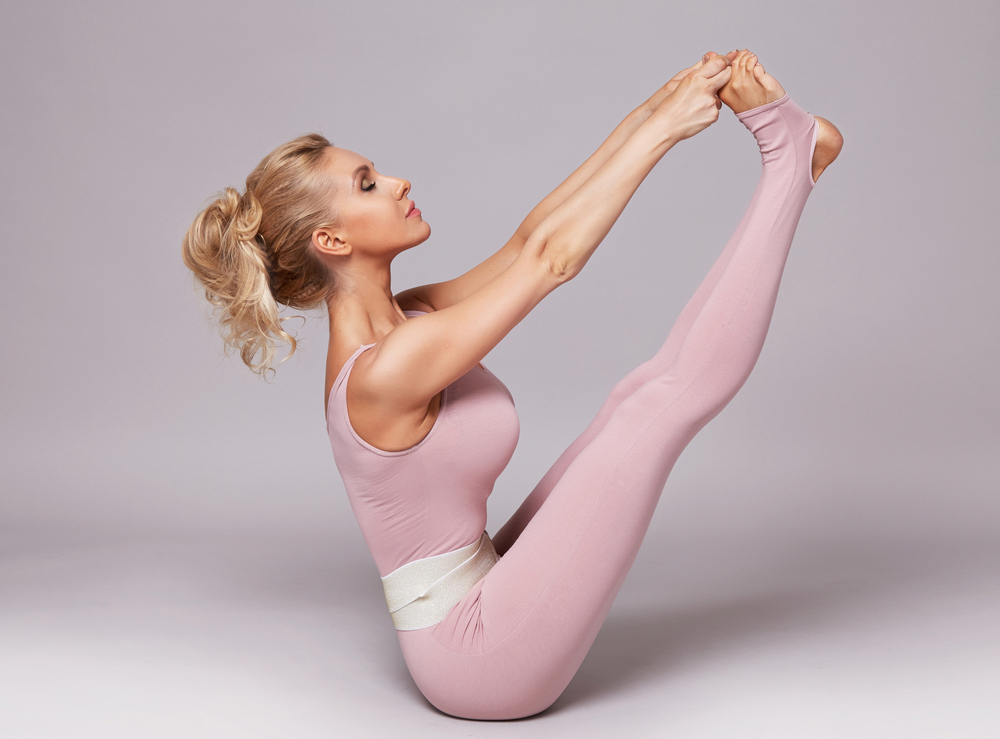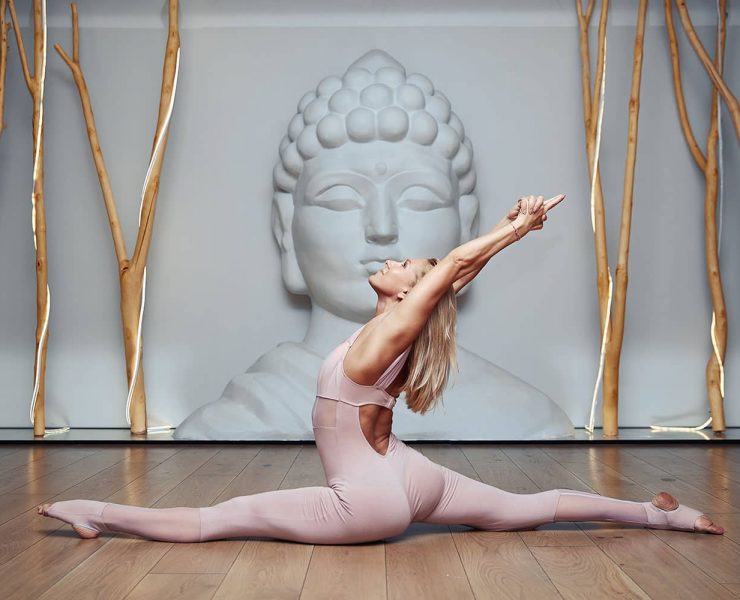
Meditation coach Emma Morrison is the go-to person for those…
Aparigraha is the last Yama in Pantanjali’s Eight Limbs of Yoga. It often translates to non-greed and non-attachment.
Yamas are the moral guidelines of yoga. Practitioners use them to live by. The Yamas can influence your relationships with others as well as with yourself.
These moral codes can be applied both on and off the mat.
And these practices help us benefit ourselves as well as the world around us.
What Is Aparigraha?

Aparigraha is often translated as “non-greed,” “non-possessiveness,” and “non-attachment.”
The word “graha” means to take, to seize, or grab. The word “pari” means “on all sides.” And the prefix “a” negatives the word itself, meaning “non.”
Altogether, the word Aparigraha means not taking more than needed.
It encourages us to practice non-acceptance and non-accumulation. Practicing these two together helps you develop a better attitude. You will detach from things you no longer need. And you will have more trust and self-reliance.
The virtue of aparigraha helps us learn to take what is necessary. And take no more than is needed.
One should not try to keep or possess beyond the necessities of life. They should also not try to hold on to more than what is immediately required.
Aparigraha teaches us not to concern ourselves with the outcome of a situation. Instead, we should only be concerned with the present moment.
Focusing on what we are doing now helps to center and ground us.
Practicing aparigraha also includes living a simple life. This frees us up to immerse ourselves in the universe. We can appreciate the reverence around us when we are no longer cluttered. Let go of your cravings. Stop clinging on for dear life. Just enjoy what is.
If you feel that you lack in any area of life, start practicing aparigraha.
This practice will bring you abundance. It will make you feel free to nurture, share, and care.
Benefits of Practicing Aparigraha

#1. Access to higher knowledge
When you no longer desire possessions, you will feel free from the material world. This shift in mind will give you a broader perspective. It will allow you to focus on the purpose of your birth.
You may even discover new insights into your present and past lives.
Practicing Aparigraha will allow you to learn more about the law of karma. You will understand that there are many lessons to be learned. And you must unravel these lessons before attaining realization.
Patanjali describes aparigraha and the anxieties around it as obstacles to knowledge. Freedom from attachment results in knowledge.
And the entire course of the journey will become clear.
In this way, aparigraha allows you to become independent and free. Your mind will become pure and things will start to quiet down.
#2. Gain self-reliance

Non-accumulation and non-attachment mean not needing to depend on others. When we search for happiness outside of ourselves, it is only temporary.
True happiness and stability come from within.
Letting go allows us to accept new opportunities. We can accept what we become and broaden the gifts we are able to receive. Collecting or hoarding things implies a lack of faith in oneself. But observing aparigraha means living as simply as possible.
Through aparigraha, you can train the mind not to feel loss. You will not feel that you lack anything. You will have cultivated your abundance from within.
When things are truly necessary, they will reveal themselves at the proper moment.
Non-accumulating also means gaining confidence. You will become more self-reliant as you recognize your own abilities. By focusing inward, you are acknowledging your existence. You are no longer relying on others to define you.
You can acknowledge yourself.
#3. Greater enjoyment in life
Being preoccupied with possessions prevents us from living freely and nobly. Instead, pay attention to how much you take in. How much can you do when you have the tendency to hoard?
If you free up your space, you can allow energy to move more easily and freely. This space will be filled by whatever the universe has to offer. This freeness of energy will start to flow more properly. And you will begin living in the present moment.
Without realizing it, our possessions start to possess us.
Then they start to control and dictate our lives. They constantly demand our attention. But where else could we focus our energy?
Storage, repairing, maintenance, anxiety, and attachment are prisons. They can imprison us and rob us of our freedom and joy.
Focus on the present moment and what it has to offer.
And you will discover more joy and happiness in your life.
#4. An Understanding Of Impermanence

The sooner we allow the idea of impermanence to sink in, the easier it is to balance. You will find yourself feeling lighter and less weighed down.
Accept the challenge to be present.
This way, you will not take the present moment for granted.
Everything changes and shifts. That means that the present moment cannot be duplicated anywhere. It is important to recognize the sacred nature of now.
#5. Unconditional Love
Aparigraha teaches us not to create attachments to anybody, including loved ones. This does not mean that you cannot love others.
But this sense of non-attachment will help you cultivate belonging without possession.
You can belong to everyone without being codependent. Others can belong to you without being jealous or trapped. The art of letting go and living life means opening up your palms. Open your mind and your heart.
You will find there is more love in freedom than in possession.
All things, concepts, and people can enter, exist, and exit. They can do these things effortlessly without bondage or dependency. The natural flow of life makes it easier to breathe. And allows others to explore themselves while feeling unconditionally tethered to you.
Allow unconditional love to seep into your life. It will provide you more freedom and peace than clinging on to something.
Aparigraha On the Mat

During your asana practice, you have many opportunities. You can observe fear and insecurity. And this can restrict your life force. Do you find yourself holding your breath during challenging moments?
Try breathing deeply. This will allow you to flow smoothly from one posture to another. By letting go of the idea of perfection, you can enjoy challenges. They are temporary moments of growth. And you can enjoy the transitions in between as well.
Mat practice also observes whether we are attached to achieving success.
By focusing on a specific pose, we lose sight of the moment itself. Instead, try observing how your practice makes you feel.
Clinging on to fear only holds us back. But aparigraha lets us enjoy the posture as it is happening. In order to have a deeper experience, you must let go. Be prepared to say goodbye to attachments. Let your fears, fix ideas, and past experiences dissipate. And you will start to notice a shift.
Practicing on the mat allows us to apply off the mat.
In this way, focus on your career as it is now. Not what it will be. Let go of unhealthy relationships from people and things. True wealth comes from within.
Our yoga practice can help us notice these tendencies. It is not there for us to judge. Rather it offers us information. The first step to practicing aparigraha on the mat is noticing and listening.
True change starts when our patterns and tendencies are recognized. They must be seen clearly and objectively.
In asana practice, the mind can wander. But aparigraha helps to bring us back to the present moment. Take a moment in Child’s Pose if you feel distracted. Forget about the outcome of your practice. Forget about what poses were challenging or easy for you.
Remind yourself why you are practicing yoga.
Remember that your body and your practice are unique. Let go of your expectations and desires. Practicing yoga without attachment will allow you to find more joy. You will discover happiness in each pose.
Practice for the love of practicing.
The sheer joy of your practice is the greatest reward in itself. Move your body in a way that feels good. Do not force or push beyond your edge. The body will unfold naturally. And over time, more challenging asanas will become accessible.
Breathwork and meditation also have a calming effect on the mind.
They can help make your perception more clear. Being more mindful in your actions will help you practice aparigraha. And after a while, this mindset will become effortless.
Aparigraha With Possessions

Aparigraha teaches us to stop looking for fulfillment in material things. Happiness and securities do not come from physical objects.
Possessions can only bring momentary joy.
And relying on external things for happiness will leave you constantly disappointed.
Aparigraha reminds us to live in the mind. Do not get caught up in small and unimportance things. The pursuit of items should not be the main goal in life.
You should not be defined by what you own.
Release your attachment to material things. You will feel a sense of freedom and relief when you do. Weighing ourselves down with material possessions only adds to our physical and energetic baggage.
When we become attached to possessions, we worry about losing them. In this way, we feel that we lack. Lightening this load can help us live less cluttered lives.
In our homes and minds, we can create more space for light and possibility.
Aparigraha in Relationships

There is a common misconception about non-attachment with relationships. Aparigraha does not say that you should not have meaningful connections with others.
But aparigraha protects us from unhealthy relationships.
You should not engage in obsessive relationships that lack boundaries. Loving others without possession allows you to enjoy the relationship more. Do not obsess over them or their actions. Love them in a way that makes them feel free. And let go of ones who steal your joy or take too much from you.
You are just as deserving of being loved and feeling free.
Cultivate healthy relationships that are not codependent. But give you the space to breathe.
Aparigraha in Mental Baggage

Sometimes, we can get attached to unmet expectations. We hold on to grudges and negative emotions like resentment and loneliness. When you feel angry or lost, you might focus on the what if’s in life.
But these thought patterns do not serve us well.
When thoughts fester, they can impair our ability to live. We stop seeing the present moment for what it is.
Non-attachment helps us let go of negative thought patterns. Aparigraha gives us the perspective to notice the present.
But becoming attached to positivity can also hinder our experience. It is important to take in both the positive and negative in life. Desiring only positivity can leave us feeling disappointed.
But accepting both good and bad can make more space for us to enjoy life.
There is a Sanskrit word “Parinamavada.” It teaches us that “everything is in a constant state of flux.” Change is the only constant we can expect. And embracing change allows us more freedom. We are free to work and do what we love without worrying about the outcome.
Instead, try these tips to start shifting your mindset:
– Be clear on what you want and what you need and notice how they differ
– Become aware of discontentment and bottomless wishing
– Be careful of desires as they can lead to a vicious cycle of wanting more
– Remain in the here and now
– Be watchful of accumulating for the sake of having
– Appreciate and cherish what you already have
– Let go of the fear of losing
– Move to a smaller, more comfortable home
– Keep your rooms spacious by having minimal furniture
– Do not cling to things so tightly
– Give away or toss out things you do not need
– Be balanced and judicial in how much you take, use, and keep
– Just like physical space, take time to declutter the mind
– Let go of ideas, concepts, patterns, and habits that no longer serve you
– Don’t allow praise and compliments to hold space in your mind
– Don’t allow hurt and insults to hold space in your heart
– Neither hold successes or failures
– Don’t cling to a name, reputation, or identity
– Be present and do not live in regrets about the past or dreams of the future
Aparigraha for Goals

Failure happens. Goals do not always materialize. But non-attachment helps to prevent devastation when goals are not met.
Setting goals is great and helpful. But aparigraha helps us reset and adapt when things do not come to fruition. It helps us reassess our situation. We can shift and change our goals. Sometimes, we may find that our past goals no longer serve us.
Having adaptable goals is key to practicing aparigraha.
Final Thoughts

Practicing non-attachment helps you experience a greater sense of inner peace. By letting go of material possessions, you will discover more freedom.
You will learn to cultivate self-reliance.
In this way, you will not look to others or objects for your happiness. You will feel free to do what you love. And you will not be overly concerned with the outcome.
Allow yourself to experience true and lasting inner peace. Allow yourself to accept past mistakes or milestones. Aparigraha guides us to keep a hold of things that serve us well. It helps us let go of everything else we do not need.
Getting rid of non-essentials focuses us on what matters most in life.
The practice of aparigraha also invites us to notice our own tendencies. We can observe how we hold onto memories, prejudices, past hurts, events, or people. And by recognizing those tendencies, we can change them for the better.
Notice how these attachments keep us from experiencing the present. Find your passion for life through simplicity and joy. Aparigraha inspires us to forgive and let go. It provides us a process of healing. It heals wounds whereas non-forgiveness keeps them open. If they are not serving you, they must be let go of.
Do not search for intentions behind others’ mistakes.
Just see a mistake as a mistake. It is not yours or others. It just is. Clear the space between you and others. Forget, forgive, and move on. This will allow you to become the light and love that you truly are.
Additionally, prioritize your own self-care.
Feeling afraid of insecure can make us feel the need to cling. We might want to control those closest to us. But this does not allow them to experience life fully. It also does not respect their individual wishes, ideas, and truths.
Instead, find ways to nourish, love, and center yourself. This will help you feel independent and strong. You will not need to rely on others.
And you will give space to others to be who they need to be.
Choose to dedicate time to your asana, breathing, and meditation practice every day. Notice what you demand of yourself. And recognize that there is no need for such anger.
Demanding rights does not bring you rights. And giving them away does not take them. Cultivate a sense of inner peace and stability.
And no one can ever take that away from you.
What's Your Reaction?
Meditation coach Emma Morrison is the go-to person for those living in Salt Lake City, Utah, who need to release stress and tension or simply dive deeper into their meditation practice. In her writing, you’ll receive useful information on how to live a more fulfilling life.














